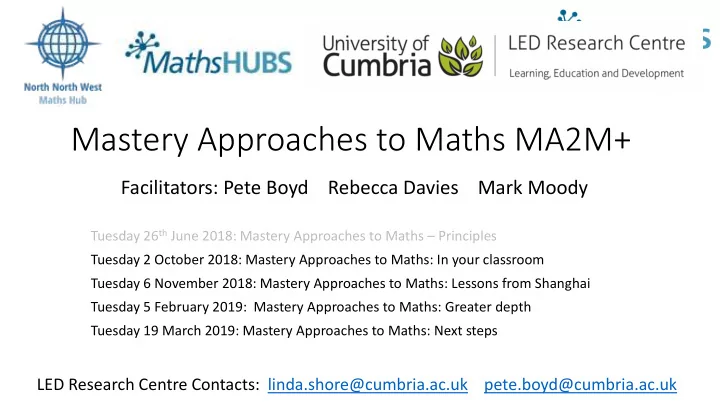

Mastery Approaches to Maths MA2M+ Facilitators: Pete Boyd Rebecca Davies Mark Moody Tuesday 26 th June 2018: Mastery Approaches to Maths – Principles Tuesday 2 October 2018: Mastery Approaches to Maths: In your classroom Tuesday 6 November 2018: Mastery Approaches to Maths: Lessons from Shanghai Tuesday 5 February 2019: Mastery Approaches to Maths: Greater depth Tuesday 19 March 2019: Mastery Approaches to Maths: Next steps LED Research Centre Contacts: linda.shore@cumbria.ac.uk pete.boyd@cumbria.ac.uk
You Cubed https://www.youcubed.org/ • Mastery approaches to maths rest on a teacher belief that virtually all my children can succeed in maths – Boaler uses growth mindset to tackle this head on • Mastery approaches to maths are linked to social justice issues, by helping to stop the labelling of children and by raising expectations for all
Rosie’s Lesson: An example of a Singapore Maths mastery approach Lesson phase Outline The whole class explores an ‘anchor problem’ through paired discussion and whole class Exploring discussion. The teacher listens to children’s mathematical reasoning and uses prompt Anchor Task questions to ensure that all pupils are challenged. The teacher gathers together pupils’ different methods and the class discuss them. Mistakes Structuring are welcomed as an opportunity for learning. Pupils record what they have been doing in their maths journals – there is an emphasis on Journaling showing things in different ways and effective communication of thinking. Reflect and refine ‘Let’s have a look to what the children in the textbook came up with’ The textbook is introduced and there is a greater emphasis on teacher explanation during this phase. The teacher starts guides the class through examples of similar problems. The pupils then Practice work through more examples independently with teacher support for individuals if necessary. The practice tasks are typified by their mathematical variation – they are designed to extend pupil’s thinking.
Rosie’s Singapore Maths (Maths - No problem! ) lesson…
Rosie’s lesson: Exploring the problem Low threshold, high ceiling Challenging all learners Teacher framing Structuring / Neriage Gathering and evaluating methods Lets see what the children in the textbook have come up with Journaling Guided Practice Guided practice with mathematical variation
Rosie’s Singapore Maths (Maths - No problem! ) lesson…
Distributive rules Recontextualising rules Evaluative rules (Basil Bernstein, 2000; Stephen Puttick, 2015; Pete Boyd & Andy Ash, 2018a; 2018b)
Teacher strategies and beliefs… Boyd, P. & Ash, A. (2018) Mastery Mathematics: Changing teacher beliefs around in-class grouping and mindset. Teaching and Teacher Education, 75 , 214-223. Available at: https://doi.org/10.1016/j.tate.2018.06.016 Boyd, P. & Ash, A. (2018) Teachers framing exploratory learning within a text- book based Singapore Maths mastery approach. Teacher Educator Advancement Network Journal 10(1): 62-73. Available at: https://ojs.cumbria.ac.uk/index.php/TEAN/article/view/442 Open access video CPD resource: http://insight.cumbria.ac.uk/id/eprint/3286/
Mastery Approaches to Maths MA2M+ Facilitators: Pete Boyd Rebecca Davies Mark Moody Tuesday 26 th June 2018: Mastery Approaches to Maths – Principles Tuesday 2 October 2018: Mastery Approaches to Maths: In your classroom Tuesday 6 November 2018: Mastery Approaches to Maths: Lessons from Shanghai Tuesday 5 February 2019: Mastery Approaches to Maths: Greater depth Tuesday 19 March 2019: Mastery Approaches to Maths: Next steps LED Research Centre Contacts: linda.shore@cumbria.ac.uk pete.boyd@cumbria.ac.uk
Recommend
More recommend